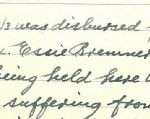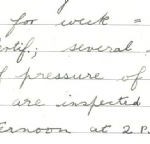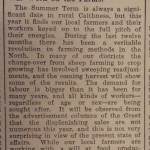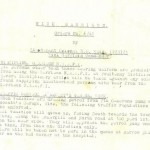Back in April, British and Commonwealth forces had been driven out of Greece and had retreated to the island of Crete. Now 23,000 German paratroopers and glider soldiers landed on the island; although the invasion would ultimately be successful the death toll would be so high that Germany would never use airborne troops like this again. On 24 May British ships intercepted the German battleship Bismarck and cruiser Prinz Eugen in the Denmark Strait; HMS Hood was sunk with the loss of some 1,416 crewmen.
 At the start of the month the Luftwaffe had mounted a heavy bombing raid on a number of British cities, among them Clydeside. Now, on 23 May, the head teacher of Gillock School recorded in the log book: “The sum of 13s 3d was disbursed from the penny-a-week Red Cross box. Essie Bremner collected 12s 3d last night. A dance is being held here to-night in aid of Clydesiders suffering from air raids.”
At the start of the month the Luftwaffe had mounted a heavy bombing raid on a number of British cities, among them Clydeside. Now, on 23 May, the head teacher of Gillock School recorded in the log book: “The sum of 13s 3d was disbursed from the penny-a-week Red Cross box. Essie Bremner collected 12s 3d last night. A dance is being held here to-night in aid of Clydesiders suffering from air raids.”

The Scottish Education Department had ruled that all children in Scottish schools should have their gas masks inspected weekly, and should also practice putting them on every week. The head teacher of Stemster School recorded on 23 May, “Several senior pupils absent because of pressure of farm work. Gas masks are inspected and tried on every Friday afternoon.”
 Now that spring was well advanced and the crops were being sown, the John O’Groat Journal reflected on the changes affecting agriculture since the war began. “During the last twelve months there has been a veritable revolution in farming methods in the North. In many of our districts the change-over from sheep farming to crop growing has involved sweeping readjustments, and the coming harvest will show some of the results.” But, the reporter warned, “The ploughing-up of land that has been laid down to grass at considerable expense is not the simple process which it may appear to be, and a good case can be made out for an increase in the amount of subsidy.”
Now that spring was well advanced and the crops were being sown, the John O’Groat Journal reflected on the changes affecting agriculture since the war began. “During the last twelve months there has been a veritable revolution in farming methods in the North. In many of our districts the change-over from sheep farming to crop growing has involved sweeping readjustments, and the coming harvest will show some of the results.” But, the reporter warned, “The ploughing-up of land that has been laid down to grass at considerable expense is not the simple process which it may appear to be, and a good case can be made out for an increase in the amount of subsidy.”
Finally this week, the Wick Garrison Commander, Lt. Col. Haig, evidently felt that some aspects of discipline needed tightening up. He therefore issued an order, part of which gave very detailed instructions on queuing for petrol at 7th Camerons’ pump at Mowatt’s Garage, Wick. (“All vehicles will queue up … along the Ackergill and North road at 100 yard intervals … care will be taken not to park in the queue at narrow places or on the bad corner at the hospital” – the garage was situated on George Street and is now the Caithness Tyre Company; the hospital referred to would have been Bignold Cottage Hospital)
The other part of the order addressed discipline at the NAAFI (i.e., the stores and canteen): “All persons other than those wearing uniform are prohibited from using the Garrison NAAFI at Poulteney Distillery. Severe disciplinary action will be taken against any soldier found supplying unauthorised persons with beer from the Garrison NAAFI”.
